The new global landscape brought about by the evolution of the Internet of Things (IoT), big data and artificial intelligence has prompted urban decision-makers to harness the power of digital technologies to enhance urban resource allocation and innovations. As an institution rooted in Macao with a global perspective, the State Key Laboratory of Internet of Things for Smart City (SKL-IOTSC) at the University of Macau (UM) brings together a team of interdisciplinary researchers to address core scientific problems facing smart city development and IoT research, with the aim of generating innovative technologies and sustainable solutions for smart cities.
Core Innovation Hub for Smart City Development
As crucial hubs for cutting-edge research, state key laboratories (SKLs) are institutions established with the approval of China’s Ministry of Science and Technology (MOST) in top-notch universities and research institutes across the country. With the support of the Macao SAR government and the Macao Science and Technology Development Fund, UM established SKL-IOTSC upon the endorsement by MOST in 2018 and it is the first SKL of its kind in China. It is also the third SKL at UM. In line with the national ‘dual carbon’ strategy to build a salubrious and resilient smart city, the laboratory conducts fundamental and applied research through interdisciplinary collaboration to bring forth technological innovations dedicated to smart city development.
Led by Chair Professor Yonghua Song, rector of UM and director of the laboratory, and composed of interdisciplinary researchers with strong academic backgrounds, SKL-IOTSC focuses on research in advanced IoT technologies, undertaking large-scale national projects and nurturing talent with both theoretical knowledge and practical skills. This research will not only benefit smart city development in Macao, but also help to gain momentum for the growth of the Guangdong-Hong Kong-Macao Greater Bay Area (GBA).
Prof Song says that the laboratory is committed to achieving technological breakthroughs in strategic fundamental research that would accelerate progress towards building sustainable smart cities and applying research results. ‘Working together with professionals from various sectors, we will create a smart city blueprint tailored for Macao, stride towards China’s “dual carbon” goals, and facilitate the development of smart cities across the country,’ he says.
SKL-IOTSC devotes itself to strategically addressing the national needs for pilot smart city development and the bottlenecks facing the IoT industry. To this end, the laboratory has established fundamental technological synergies with technologies such as wireless communications, urban big data, and artificial intelligence (AI) to support smart city applications in smart energy, intelligent transport, and disaster prevention. All its efforts made in fundamental and applied research are essential for laying a solid foundation for smart city development and industry-academia collaboration.
In terms of fundamental research, considering intelligent sensing and network communication are at the core of urban interconnectivity, the researchers have conducted studies extensively on both theories and technologies in this field. Significant breakthroughs have been made in intelligent reconfigurable surface-empowered communications, integrated sensing and communication, and space-air-ground integrated network, strengthening the internet of everything for cities.
Urban big data and AI are also key domains of fundamental research which the laboratory has been exploring and where researchers have been generating new findings. Substantial progress has been made in spatiotemporal representation learning, spatiotemporal modelling, inference of large-scale and complex knowledge graphs, cross-city multi-granular knowledge transfer, algorithmic game theory, and multimedia big data forensics and security, and these research achievements will support urban decision-making and smart governance.
With respect to applied research, researchers have conducted in-depth studies on theories and methodologies for optimising the operation and flexible power distribution of integrated energy systems (IES) for the ‘dual carbon’ goals. Significant progress has been made in energy data mining and utilisation, flexible power demand side management, IES security and protection, and R&D and application of key components for flexible power distribution. In addition, the researchers have developed efficient sensing, control, and decision-making technologies for autonomous driving. They have also explored intelligent transportation innovations through large-scale traffic data processing and integrated traffic planning, which further reinforces the intelligence in future transportation systems. Moreover, the researchers have investigated the mechanism of coastal marine disasters, especially under extreme climate events, and proposed advanced methods for structural health monitoring and intelligent operation and maintenance, which are significant in improving urban public safety and resilience.
SKL-IOTSC has led or undertaken various projects under MOST, the National Natural Science Foundation of China, and the Macao Science and Technology Development Fund, and has established several Guangdong-Hong Kong-Macao joint laboratories to foster research collaboration in the GBA. The laboratory has received a substantial number of national and regional awards for its scientific and technological achievements, including a second prize in the State Scientific and Technological Progress Award, a first prize in the Guangdong Science and Technology Progress Award, the Guanghua Engineering Science and Technology Prize, the Ho Leung Ho Lee Foundation Science and Technology Progress Award, as well as Macao Science and Technology Awards. These accolades are a testament to the laboratory’s recognition in Macao and across the country.
Macao’s First Smart City Simulation and Decision-making Platform
SKL-IOTSC has built the first smart city simulation and decision-making platform in and for Macao. The platform consists of various modules, including urban big data, smart energy, intelligent transportation, structural health monitoring of civil infrastructure, and urban flooding simulation, and it can further facilitate interdisciplinary collaboration for sustainable smart city development. Based on a 3D graphic model of Macao, the laboratory has also established a city-wide simulation system with digital twin technology, through which researchers can collect traceable real-time data, develop simulation models, and conduct pilot tests.
The researchers have implemented effective interactive simulation models of urban systems in various settings and obtained fruitful application results. For instance, they developed a COVID-19 hotspot map for Macao in June 2022 through the platform (urban big data module) with spatiotemporal big data and knowledge graph technologies. The real-time operating system enhanced the city’s capability in epidemic prevention. The researchers will continue to contribute to the city’s competence in coupling a physical replica with its digital twin model in order to provide theoretical and technological support for intelligent urban regulation and decision-making.
Cultivating High-Calibre and Interdisciplinary Talent
In line with the national strategy to build a global powerhouse in science and technology, SKL-IOTSC spares no effort to nurture high-calibre and interdisciplinary professionals in the fields of IoT, AI and big data to facilitate the extensive applications of these technologies. UM’s academic capacity has encouraged many outstanding overseas young scholars and local graduates to pursue their dream as researchers at SKL-IOTSC. Since its inception, the laboratory has successfully trained more than 100 graduates with master’s or doctorate degrees. Through its top-tier faculties and talent nurturing scheme, the laboratory not only strives to accelerate the transfer of its research results and the development of the high-tech industry in Macao, but also aims to strengthen the country’s independent innovation capability and R&D in science and technology.
To enhance digital literacy among adolescents in Macao and inspire them to become high-tech professionals in the future, SKL-IOTSC organises various science promotion activities for local secondary school students on a regular basis to stimulate their interest in science and technology. Activities such as the UM Open Day, distinguished lectures, seminars, competitions, and visits to the laboratory enable local students to better understand the concept of a smart city and learn more about the latest developments in IoT. Furthermore, the students can enjoy learning through hands-on experiments and interactions with researchers and students at SKL-IOTSC. All efforts made to enhance teenagers’ digital literacy are crucial to the expansion of the local talent pool.
Advancing Technological Innovation in a Global Landscape
Looking ahead, SKL-IOTSC will continue to optimise resource integration by placing equal emphasis on teaching and research, and adhere to its position as an institution rooted in Macao with global perspectives. At the same time, the laboratory will uphold international standards to advance technological innovation in IoT for smart city development, making contributions to this research front that are not only important to Macao and China, but also to the world.
‘Looking back in history, each industrial revolution led to radical changes to the global economic landscape. UM is now at a critical moment in history where digital technology is setting off a new round of reform. We will seize the opportunity to enhance the academic and research competence of SKL-IOTSC, in order to help UM leverage its promising innovative research results to accelerate the development of novel digital infrastructure, propose a world-leading smart city blueprint for Macao, and collaborate with leading enterprises to bring forth smart city initiatives,’ says Prof Song.
Text / Kelvin U
Photo / Jack Ho, with some provided by the interviewee
English Translation / Winky Kuan
Source: UMagazine ISSUE 27
Related articles:
1. Supporting smart city development — Intelligent sensing and network communication
2. Driving smart applications – Urban big data and intelligent technology
3.Creating a low-carbon smart energy system with high efficiency
4. Developing safe and efficient autonomous driving technologies
5. Enhancing structural health monitoring and disaster response capabilities
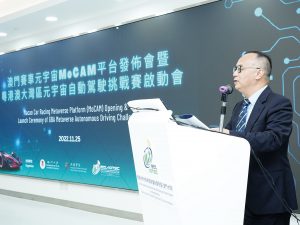
Prof Yonghua Song
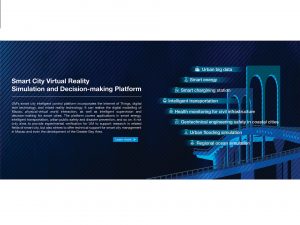
The Smart City Virtual Reality Simulation and Decision-making Platform
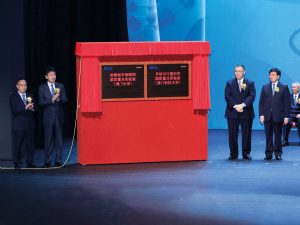
UM established SKL-IOTSC, the first State Kay Lab in its area of research, in 2018.
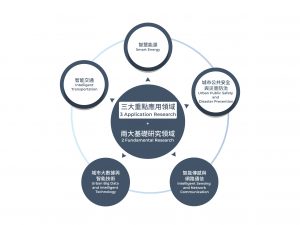
Research layout: two fundamental fields and three typical application fields
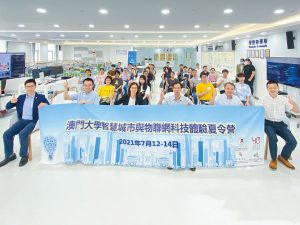
SKL-IOTSC provides science education to a number of secondary schools in Macao
